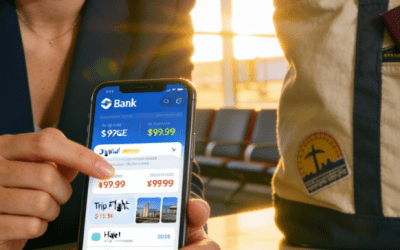Travel offers us a chance to escape our daily routines, immerse ourselves in different cultures and explore new horizons. Every year, the tourism industry helps millions of people have transformative travel experiences—and now, it can do even more with the help of the latest technologies. AI tourism has arrived, and it’s already changing the face of the travel industry.
Whether your business offers tours, accommodation, or any other of the countless services that make up the travel industry, incorporating AI into your business model is the best decision you can make right now, as it can put you head and shoulders above competitors at a very reasonable price point.
In this blog post, we’ll go over some of the creative ways that travel-related businesses are already incorporating AI into their products and services. These applications may even give you ideas to help your business harness the power of this advanced technology and take artificial intelligence tourism to the next level.
The new frontier in customization
Within the travel sector, there’s one kind of information that always seems to be in high demand: recommendations. As any tour guide or concierge can tell you, most travelers are on a constant hunt for recommendations, but they often struggle to clearly express what their interests are and what they’re looking for. If you recommend an experience that they end up loving, you’ve gained a loyal customer, but sometimes knowing what to recommend to whom feels like a guessing game.
For that reason, one of the most significant ways AI travel is transforming the industry is through personalized recommendations. Algorithms can analyze vast amounts of data related to traveler preferences, historical trends and user behavior in order to curate tailored suggestions for each individual. Whether your client is planning a weekend getaway or a month-long adventure, trip planner AI software can help them make it memorable.
Trip Planners with AI
AI-powered trip planners are a valuable tool for travelers, simplifying the process and making it effortless. By selecting filters such as language, travel dates, or type of trip (romantic, beach, eco-friendly, among others), customers can instantly receive the most relevant suggestions based on their profile data.
By providing this value to customers without any cost, you are sure to earn their satisfaction, loyalty, and recommendations. Additionally, the fully customizable interface of the trip planner allows you to tailor it to your brand’s look and feel, and even integrate your own services and third-party agreements. In essence, the client will be using a sophisticated trip planner, but all they’ll see is your business.

A personal assistant for every customer
Now we’ve come to another of the main ways that artificial intelligence tourism is helping travelers spend less time planning and more time exploring and enjoying themselves. A personal assistant used to be a luxury that only the wealthiest people could afford. But now, the technology behind AI assistants is developed enough to make communicating with these chatbots feel as natural as texting with a knowledgeable and articulate concierge.
Virtual personal assistants make AI travel easier than ever by helping customers plan every aspect of their trips in the most efficient way possible: by asking questions directly instead of scrolling through pages of links on Google. Whether the client is looking for events to attend at their destination, wants help booking an affordable flight, or needs clarification regarding visa and vaccine requirements, the AI tourism industry is streamlining every step of the way.
Case study: Smartvel’s Event Calendar
Smartvel’s system processes more than two million events per year from over 400 online sources. This abundance of information is then verified, enriched, and categorized, all with the express purpose of curating the most relevant and customized travel ideas for your clients. But all of that effort would be in vain without a user-friendly interface that helps customers access the information in an intuitive way.
The Smartvel Event Calendar is seamlessly integrated into your company’s website and allows travelers to plan their trips in the most efficient way possible. The calendar offers event suggestions to users based not only on their trip dates, but also their personal profiles. This product can be fully customized to match the look and feel of your brand, so nothing distracts from your business.
Case study: Explore&Go by Smartvel
The first step of any trip is figuring out where to go. And with an endless list of destinations to consider, would-be travelers can get overwhelmed and lose motivation. If they don’t find a place that really catches their interest within the initial phase of considering a trip, they might just end up staying home.
Smartvel realized the need for a software that can process information about a large number of destinations and present travelers with the ones that best fit their personal profiles and what they’re looking for at a given moment. Your business can now integrate Explore&Go, fill it with your own destinations, and customize the interface to reflect your brand identity. Turning interest into conversions has never been easier.

Better data for better experiences
You don’t have to be an artificial intelligence travel expert to know that personalized recommendations don’t come from thin air—they’re a product of advanced data collection and processing technologies that can turn a bunch of seemingly random clicks into a coherent narrative about the customer’s interests and motivations.
For this reason, CRM enrichment is a first step that can’t be skipped if you want to offer the best service to your clients. You can improve your CRM data by using content widgets. A customer simply needs to be logged on to your website and tagged with an ID number; their interactions with travel content will then be tracked, allowing you to send them customized recommendations via email or your app.
Final thoughts
From trip planners with AI, AI flight planning, to a host of other digital services available to travelers, artificial intelligence tourism is not going anywhere anytime soon.
For businesses within the competitive travel industry, a unique opportunity just arose to take advantage of this fast-advancing technology and offer new products that go above and beyond customer expectations. It’s up to your company to decide whether to seize the moment or risk falling behind competitors that do.





